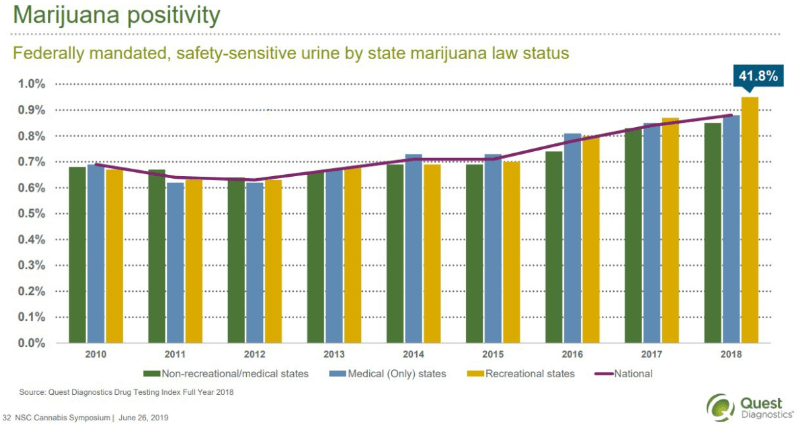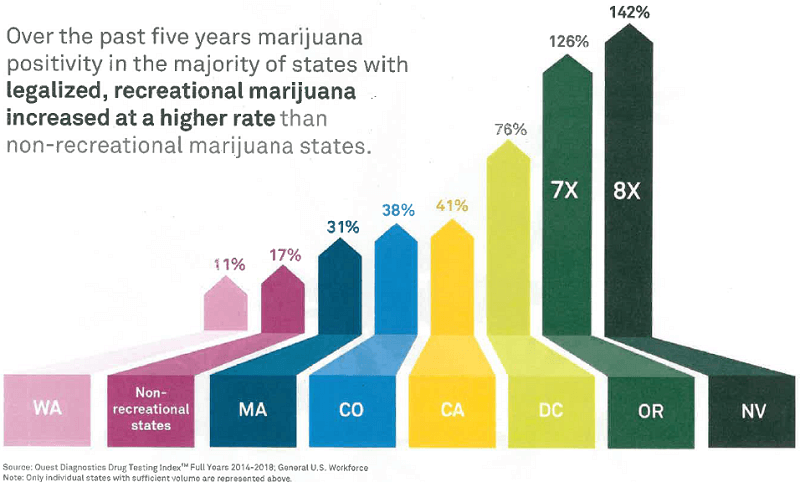Thank you for holding this important hearing, “Cannabis Policies for the New Decade,” and for allowing the National Safety Council (NSC) to submit comments for the record.
NSC is a 100-year-old nonprofit organization with the mission of eliminating preventable deaths at work, in homes and communities, and on the road through leadership, research, education, and advocacy. Its more than 16,000 member companies represent employees at more than 50,000 U.S. worksites.
Cannabis laws are changing rapidly, and NSC is concerned that safety is being left behind in policy discussions. The fact that cannabis is an impairing substance is rarely mentioned. NSC encourages this committee to prioritize the safety, health and wellbeing of your constituents as you consider effective federal cannabis policies. It is imperative that this committee keep public safety at the forefront of policy decisions.
We would like to add information to the hearing record on the following topics:
- Employers should be able to maintain a substance-free workplace.
- Workers in safety sensitive positions should not be allowed to use cannabis.
- More research needs to be conducted on cannabis effects, especially regarding safety.
- Greater funding is needed for drug recognition experts.
- The developing brain is especially susceptible to damage from drug exposure.
- Cannabis and cannabis-derived products need robust and accurate labeling.
As you know, state laws vary, but cannabis and cannabidiol (CBD) containing more than 0.3% tetrahydrocannabinol (THC) remain federally illegal. Despite this, cannabis is the most widely consumed illicit substance worldwide, and nearly 55 million Americans 18 or older currently use cannabis. This use affects safety on the roadways, in workplaces and elsewhere. Even in some occupations governed by federal oversight, cannabis use has increased recently as state laws have changed. In other occupations, cannabis positivity has increased in states with recreational use.


As seen from the charts, state legal treatment of cannabis impacts usage rates. Currently, 11 states have decriminalized cannabis for adult recreational use and 33 permit medical cannabis use. As state legislators return to work, these numbers could increase in the coming months. Changes in state laws have created uncertainty and concern about impairment in workplaces, on the roadways and in other locations. Given the increased use of cannabis among the workforce, especially in states that have legalized and decriminalized cannabis, employer drug testing should be allowed so employers can make decisions that are right for their organizations.
NSC believes that all forms of impairment present a serious threat to safety at work by increasing the risk of preventable injury and death. Workers who are under the influence of alcohol and/or other impairing drugs (legal or illegal) endanger themselves and those around them. NSC supports employer efforts to maintain a substance-free workplace to help ensure the safety of workers.
NSC also believes it is unsafe to be under the influence of cannabis while working in safety sensitive positions. With no scientific test for cannabis impairment, there is no way to determine if someone is impaired with the drug tests available today. If workers have a prescription for cannabis or any other impairing drug, they and their employers should talk about moving to non-safety sensitive positions while taking those substances for medical treatment.
Impairment from cannabis use is not only a concern in the workplace, but also on the roadway. Driving while under the influence of an impairing substance like cannabis endangers all roadway users. However, because there is no scientific test for cannabis impairment, law enforcement relies on drug recognition experts (DREs) to evaluate the signs of impairment from drugs. The U.S. needs more DREs, and Congress should support funding for more DRE training.
The lack of an impairment test and more meaningful data on effects of cannabis are problems we can solve, and NSC urges this committee to evaluate methods to increase research on cannabis. NSC is concerned about the secondary effects of moving cannabis from Schedule 1 of the Controlled Substances Act; therefore, NSC supports the bipartisan Cannabidiol and Marihuana Research Expansion Act (S. 2032) that would expand the number of institutions conducting research without changing the scheduling of cannabis. NSC encourages the introduction of similar legislation in the House.
Additional issues are arising as the legal status of cannabis is debated. As previously shown, cannabis use in states that have changed their laws is increasing, and this trend includes adolescents. The human brain continues to develop through the mid-twenties, and during this time of development, the brain is sensitive to damage from drug exposure. In 2015, more than 11 million individuals ages 18 to 25 used cannabis. Exposure to cannabis during adolescence adversely impacts brain development. Furthermore, a study comparing cannabis use before and after age 16 found that people who use it before age 16 made twice as many mistakes on tests of executive function including planning, flexibility, abstract thinking and inhibition of inappropriate responses. Congress should be aware of these impacts as you evaluate cannabis policies.
Additionally, labeling requirements for cannabis and cannabis-derived products is unclear, and in some cases unsubstantiated claims are being made. NSC applauds the oversight that has been utilized by some of the agencies here today and encourages more oversight. NSC believes all cannabis and cannabis-derived products being sold and distributed must have child-resistant packaging that specifies serving sizes and concentration of THC, packaging not appealing to children and inclusion of appropriate warning labels. Additional labeling should be considered to prioritize safety and prevent unintended consequences.
There is a great deal to consider as we evaluate changing federal and state laws dealing with cannabis. NSC appreciates the thoughtful time and effort of the Committee in evaluating proposed policy changes and the attention on safety impacts. NSC looks forward to working with you to prioritize safety.


